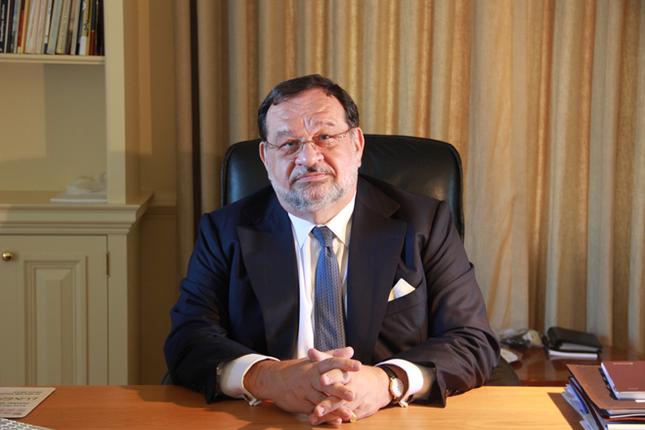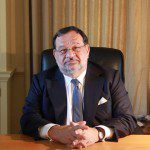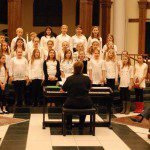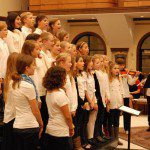A Grand Duchy Christmas and Amb. Jean-Louis Wolzfeld
By • August 15, 2013 0 2388

Jean-Louis Wolzfeld, the new Ambassador of the Grand Duchy of Luxembourg to the United States, was still getting acclimated.
Over coffee and cookies, which had an appropriately holiday feel to it, in a small room dominated by portraits of the imposing and courageous Grand Duchess Charlotte, an inspirational figure in exile during the World War II Nazi occupation and annexation of her state, we talked with Wolzfeld about Luxembourg’s cherished Christmas traditions, about Luxembourg’s role in the European Union, about U.S.-Luxembourg relations (very good), and other matters historic and cultural.
Wolzfeld became ambassador a month ago, just in time to preside over what has become practically a tradition, the annual Christmas event, musicale, concert followed by champagne and dinner presented by the Embassy Series at the Embassy of Luxembourg at 2200 Massachusetts Avenue, held Dec. 6, 7 and 8.
“I’m looking forward to it,” Wolzfeld said. “I’ve heard a lot about it already from many people including my predecessor Jean-Paul Senninger.”
“It started in 2010,” said Jerome Barry, director and founder of the Embassy Series. “When Ambassador Senninger and I were standing at the buffet table at an event at the Embassy of Turkey. He suggested we have some series events at his embassy, and we thought of it in terms of Christmas. That first year involved ‘Call Me Madam’ and was a kind of festive, three-concert holiday event centered around ‘Call Me Madam,’ Irving Berlin and his music—he wrote ‘White Christmas’ after all. Berlin’s daughter was there. We did it again last year, again with music, carolers, and a theme of Luxembourg Christmas traditions—the embassy had gifts laid outside at the door per Luxembourg custom. It’s become something really special.”
This year’s event—“Luxembourg at Holiday Time—A Celebration of Mostly Baroque Music” will include a the German School’s children’s choir singing carols of the season and performances by baroque trumpeter Marc Weydert, pianist Maurice Clement, pianist George Peachey — and on Saturday, the Thomas Circle Singers.
Barry himself will add his baritone voice to the proceedings. The evening will also include champagne, wine, hors-d’ouvres and a buffet dinner.
“Thursday is a special day when it comes to Christmas in Luxembourg,” Ambassador Wolzfeld told us. “We don’t have a Santa Claus per se, but we have St. Nicholas Day, which is celebrated December 6. The custom is that children put out their slippers in front of their doors with the hope that St. Nicholas will bring a gift.”
It’s also customary to leave out plates in the kitchen or dining room area which are filled by St. Nicholas with sweets and cookies. On Christmas Eve, Luxembourgers attend midnight mass and gather for suppers the dishes of which include black pudding and mashed potatoes and apple sauce. “I remember this from childhood very well,” said Wolzfeld, who is a 61-year-old bachelor and career diplomat. “We, too, had a good and a dark Santa, who was very strict and made sure that children receiving gifts had actually been good. It was a different time, of course, slower and more traditional. The state, the duchy and Europe has changed.”
Luxembourg is a small nation wedged among its neighbors of Germany, France and Belgium, and the cultural evidence is everywhere. “Some of the Christmas traditions come from Germany, some from France,” Wolzfeld said. “Our population is part German, French, Luxembourgers, and now, increasingly, we are getting many immigrants from Portugal.”
Wolfzeld speaks French, English, German, Italian and Luxembourgish, which he says “is more like a dialect.” But he and his capacity for languages and his record as a diplomat, speak to a state that appears very much in the European tradition, but is also, although primarily Catholic, ecumenical in its culture, welcoming in its diversity and pragmatic in its outlook toward the rest of the world. “Our economy is very good right now,” he said. “So, our immigration policy is very welcoming. Our people and our traditions come from many different cultures and traditions, and that in and of itself is a quality we can take a lot of pride in. We look outward, not just inward, and, of course, that is also what the European Union is all about, also.”
That attitude was strained during World War II when Nazi Germany sent its forces through the Ardennes and invaded France and its neighbors, resulting in the annexation of the Duchy of Luxembourg. “I think it took a long time to get over that in terms of our relations with Germany, no question,” Wolzfeld said. “One of the reasons we have such a good relationship with the United States—and we do—is that people have not forgotten that it was the United States Army which liberated us. Patton’s forces came here, and there are 7,000 graves of American soldiers here, including General Patton himself, who requested to be buried with his troops.”
“I have been a diplomat all my life,” Wolzfeld said. “It has allowed me to see the world with a practical eye, to see our similarities not just our differences.” He a permanent representative to the United Nations in the mid-1990s, as well as an ambassador to the Court of St. James and to Japan. For Wolzfeld, Japan was “a most interesting appointment. Japan was in a boom at the time, but it was a view of a very different culture and very rewarding.”
Wolzfeld remembers Washington from his time at the United Nations. “I think it was still changing at the time as a city, and there was much more crime as I recall. But it is so different now, much more cosmopolitan, if you will. There’s so many cultural opportunities now, and the cityscape has changed also. There’s an energy here.”
- Ambassador of the Grand Duchy of Luxembourg, Jean-Louis Wolzfeld.




